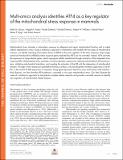| dc.contributor.author | Quirós, Pedro M. | en_US |
| dc.contributor.author | Prado, Miguel A. | en_US |
| dc.contributor.author | Zamboni, Nicola | en_US |
| dc.contributor.author | D’Amico, Davide | en_US |
| dc.contributor.author | Williams, Robert W. | en_US |
| dc.contributor.author | Finley, Daniel | en_US |
| dc.contributor.author | Gygi, Steven P. | en_US |
| dc.contributor.author | Auwerx, Johan | en_US |
| dc.date.accessioned | 2018-02-26T20:40:31Z | |
| dc.date.issued | 2017 | en_US |
| dc.identifier.citation | Quirós, Pedro M., Miguel A. Prado, Nicola Zamboni, Davide D’Amico, Robert W. Williams, Daniel Finley, Steven P. Gygi, and Johan Auwerx. 2017. “Multi-omics analysis identifies ATF4 as a key regulator of the mitochondrial stress response in mammals.” The Journal of Cell Biology 216 (7): 2027-2045. doi:10.1083/jcb.201702058. http://dx.doi.org/10.1083/jcb.201702058. | en |
| dc.identifier.issn | | en |
| dc.identifier.uri | http://nrs.harvard.edu/urn-3:HUL.InstRepos:34868852 | |
| dc.description.abstract | Mitochondrial stress activates a mitonuclear response to safeguard and repair mitochondrial function and to adapt cellular metabolism to stress. Using a multiomics approach in mammalian cells treated with four types of mitochondrial stressors, we identify activating transcription factor 4 (ATF4) as the main regulator of the stress response. Surprisingly, canonical mitochondrial unfolded protein response genes mediated by ATF5 are not activated. Instead, ATF4 activates the expression of cytoprotective genes, which reprogram cellular metabolism through activation of the integrated stress response (ISR). Mitochondrial stress promotes a local proteostatic response by reducing mitochondrial ribosomal proteins, inhibiting mitochondrial translation, and coupling the activation of the ISR with the attenuation of mitochondrial function. Through a trans–expression quantitative trait locus analysis, we provide genetic evidence supporting a role for Fh1 in the control of Atf4 expression in mammals. Using gene expression data from mice and humans with mitochondrial diseases, we show that the ATF4 pathway is activated in vivo upon mitochondrial stress. Our data illustrate the value of a multiomics approach to characterize complex cellular networks and provide a versatile resource to identify new regulators of mitochondrial-related diseases. | en |
| dc.language.iso | en_US | en |
| dc.publisher | The Rockefeller University Press | en |
| dc.relation.isversionof | doi:10.1083/jcb.201702058 | en |
| dc.relation.hasversion | http://www.ncbi.nlm.nih.gov/pmc/articles/PMC5496626/pdf/ | en |
| dash.license | LAA | en_US |
| dc.subject | Article | en |
| dc.title | Multi-omics analysis identifies ATF4 as a key regulator of the mitochondrial stress response in mammals | en |
| dc.type | Journal Article | en_US |
| dc.description.version | Version of Record | en |
| dc.relation.journal | The Journal of Cell Biology | en |
| dash.depositing.author | Finley, Daniel | en_US |
| dc.date.available | 2018-02-26T20:40:31Z | |
| dc.identifier.doi | 10.1083/jcb.201702058 | * |
| dash.contributor.affiliated | Finley, Daniel | |
| dash.contributor.affiliated | Gygi, Steven | |


